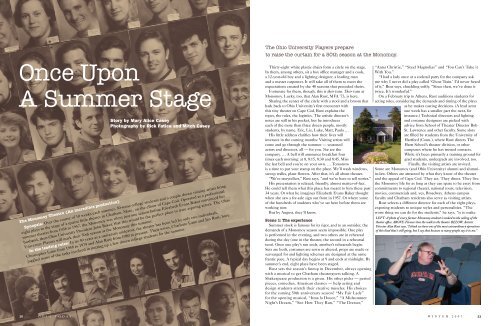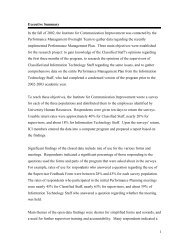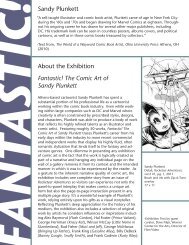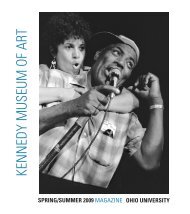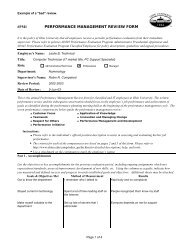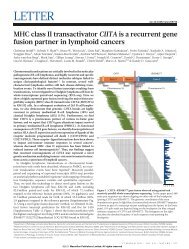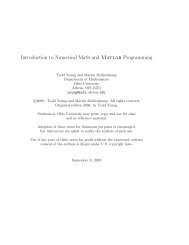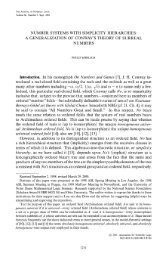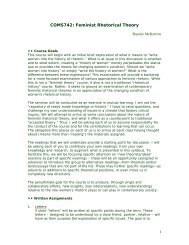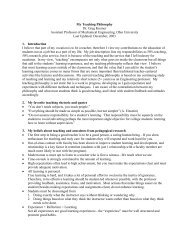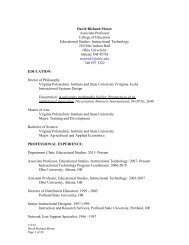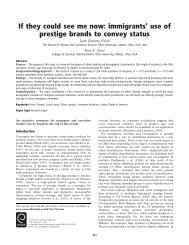Elizabeth Evans Baker: Monomoy's guardian angel - Ohio University
Elizabeth Evans Baker: Monomoy's guardian angel - Ohio University
Elizabeth Evans Baker: Monomoy's guardian angel - Ohio University
You also want an ePaper? Increase the reach of your titles
YUMPU automatically turns print PDFs into web optimized ePapers that Google loves.
Once Upon<br />
A Summer Stage<br />
The Monomoy Theatre (An incredible production)<br />
10 O H I O T O D A Y<br />
Story by Mary Alice Casey<br />
Photography by Rick Fatica and Mitch Casey<br />
Synopsis: Over the course of 10 weeks each summer, 30-some college students and a couple dozen visiting artists bring<br />
eight plays to the stage of a quaint little theater in Chatham, Mass., on the elbow of Cape Cod. Operated as a professional<br />
summer theater from 1938 to 1957, the Monomoy was silent just one season before <strong>Elizabeth</strong> <strong>Evans</strong> <strong>Baker</strong> convinced her<br />
husband, then-<strong>Ohio</strong> <strong>University</strong> President John <strong>Baker</strong>, that this would be the perfect place to train aspiring actors. The <strong>Ohio</strong><br />
<strong>University</strong> Players will mark their 50th season at the Monomoy this summer.<br />
In the leading roles: In its 49 years as a university endeavor, the theater has been led by only two individuals,<br />
Christopher Lane from 1958 to 1979 and Alan Rust from 1980 to present. Their wives, Charlotte Lane and Jan Rust, have<br />
juggled many of the tasks involved in putting up a few dozen college students for the summer.<br />
The <strong>Ohio</strong> <strong>University</strong> Players prepare<br />
to raise the curtain for a 50th season at the Monomoy.<br />
Thirty-eight white plastic chairs form a circle on the stage.<br />
In them, among others, sit a box office manager and a cook,<br />
a 12-year-old boy and a lighting designer, a leading man<br />
and a master carpenter. It will take all of them to meet the<br />
expectations created by the 48 seasons that preceded theirs.<br />
Fortunate for them, though, this is their turn. Their turn at<br />
Monomoy. Lucky, too, that Alan Rust, MFA ’73, is here.<br />
Sharing the center of the circle with a stool and a broom that<br />
hark back to <strong>Ohio</strong> <strong>University</strong>’s first encounter with<br />
this tiny theater on Cape Cod, Rust explains the<br />
ropes, the rules, the logistics. The artistic director’s<br />
notes are still in his pocket, but he introduces<br />
each of the more than three dozen people, mostly<br />
students, by name. Eric, Liz, Luke, Matt, Paula …<br />
His little address clarifies how their lives will<br />
intersect in the coming months: Visiting artists will<br />
come and go through the summer — seasoned<br />
actors and directors, all — for you. You are the<br />
company. … A bell will announce breakfast four<br />
times each morning: at 8, 8:15, 8:30 and 8:45. Miss<br />
the last bell and you’re on your own. … Tomorrow<br />
is a time to put your stamp on the place. We’ll wash windows,<br />
sweep walks, plant flowers. After that, it’s all about theater.<br />
“We’re storytellers,” Rust says, “and we’re here to tell stories.”<br />
His presentation is relaxed, friendly, almost matter-of-fact.<br />
He could tell them what this place has meant to him these past<br />
34 years. Or what he imagines <strong>Elizabeth</strong> <strong>Evans</strong> <strong>Baker</strong> thought<br />
when she saw a for-sale sign out front in 1957. Or where some<br />
of the hundreds of students who’ve sat here before them are<br />
working now.<br />
But by August, they’ll know.<br />
Scene 1: The experience<br />
Summer stock is famous for its rigor, and to an outsider, the<br />
demands of a Monomoy season seem impossible. One play<br />
is performed in the evening, and two others are in rehearsal<br />
during the day (one in the theater, the second in a rehearsal<br />
tent). Once one play’s run ends, another’s rehearsals begin.<br />
Sets are built, costumes are sewn or altered, props are made or<br />
scavenged for and lighting schemes are designed at the same<br />
frantic pace. A typical day begins at 9 and ends at midnight. By<br />
summer’s end, eight plays have been staged.<br />
Rust sets the season’s lineup in December, always opening<br />
with a musical to get Chatham theatergoers talking. A<br />
Shakespeare production is a given. His other picks — period<br />
pieces, comedies, American classics — help acting and<br />
design students stretch their creative muscles. His choices<br />
for the coming 50th anniversary season? “My Fair Lady”<br />
for the opening musical, “Irma la Douce,” “A Midsummer<br />
Night’s Dream,” “See How They Run,” “The Dresser,”<br />
“Anna Christie,” “Steel Magnolias” and “You Can’t Take it<br />
With You.”<br />
“I had a lady once at a cocktail party for the company ask<br />
me why I never did a play called ‘Ghost Train.’ I’d never heard<br />
of it,” Rust says, chuckling softly. “Since then, we’ve done it<br />
twice. It’s wonderful.”<br />
On a February trip to Athens, Rust auditions students for<br />
acting roles, considering the demands and timing of the plays<br />
as he makes casting decisions. (A lead actor<br />
one week has a smaller part the next, for<br />
instance.) Technical directors and lighting<br />
and costume designers are picked with<br />
advice from School of Theater Director Bob<br />
St. Lawrence and other faculty. Some slots<br />
are filled by students from the <strong>University</strong> of<br />
Hartford (Conn.), where Rust directs The<br />
Hartt School’s theater division, or other<br />
campuses where he has trusted contacts.<br />
While it’s been primarily a training ground for<br />
grad students, undergrads are involved, too.<br />
Finally, the visiting artists are invited.<br />
Some are Monomoy (and <strong>Ohio</strong> <strong>University</strong>) alumni and alumniin-law.<br />
Others are attracted by what they know of the theater<br />
and the appeal of Cape Cod. They act. They direct. They live<br />
the Monomoy life for as long as they can spare to be away from<br />
commitments to regional theater, national tours, television,<br />
movies, commercials and, yes, Broadway. Athens campus<br />
faculty and Chatham residents also serve as visiting artists.<br />
Rust selects a different director for each of the eight plays,<br />
exposing students to unique styles and personalities. “The<br />
worst thing we can do for the students,” he says, “is to make<br />
LEFT: A photo of every former Monomoy student is tacked to the ceiling of the<br />
theater office. ABOVE: Flowers line the walk to the theater. BELOW: Artistic<br />
Director Alan Rust says, “I think we have one of the most extraordinary operations<br />
of this kind that’s still going, but I say that because so many people say it to me.”<br />
W I N T E R 2 0 0 7<br />
11
<strong>Elizabeth</strong> <strong>Evans</strong> <strong>Baker</strong>: Monomoy’s <strong>guardian</strong> <strong>angel</strong><br />
Admirers describe elizabeth evans<br />
baker as a grand lady. Kind, but exacting.<br />
Pure in taste and spirit. John baker, if<br />
asked to reflect on 1957, likely would add<br />
“persistent” to the list of his wife’s attributes.<br />
And thank goodness for that.<br />
because of her determination, the<br />
monomoy theatre has been an invaluable<br />
educational venue for ohio university theater<br />
students for half a century.<br />
Summer vacations on Cape Cod from<br />
the 1920s forward familiarized elizabeth<br />
with the successful little theater mary<br />
winslow operated on Chatham’s main<br />
Street beginning in the late 1930s. when<br />
winslow died in 1957 and the complex<br />
went up for sale, elizabeth suggested to<br />
12 O H I O T O D A Y<br />
John, then president of ohio university,<br />
that the school buy it to give advanced<br />
acting students an opportunity to perform<br />
for theater-savvy audiences.<br />
Although he liked her idea, John didn’t<br />
think university money should fund the<br />
purchase. After some debate, he urged<br />
her to buy the property herself and allow<br />
the university to contract for its use. the<br />
transaction was completed in boston on<br />
April 7, 1958, and elizabeth saw to it<br />
that an abbreviated season of plays was<br />
presented that summer. (A stool and a<br />
broom were on the stage the first time<br />
elizabeth showed the vacant theater<br />
to Christopher lane, and that scene is<br />
repeated at the start of every season.)<br />
LEFT: Shown here securing the Monomoy sign that goes up every June, senior<br />
Liz Eggert was the company’s master carpenter in 2006. “This place forces you<br />
to be adaptable to your environment and your situation, and that’s a lesson that<br />
will stick with me through my entire professional career.” ABOVE: Grad students<br />
Michael Gerber (left) and Shelley Wilson rehearse lines last summer.<br />
this just a change of venue, and I think the faculty agree with<br />
me on that.”<br />
Ellen Fiske, MFA ’72, acted in every play staged at<br />
Monomoy in 1971 and returns often as a visiting artist.<br />
She knows what it did for her.<br />
“When you are in training, you’re getting a lot of theory, and<br />
you’re trying to make it apply in little, isolated places. And<br />
then you come here, and you just have to get up and do it,”<br />
says Fiske, who has appeared on Broadway and in commercials<br />
and soap operas. “It required me to use the tricks that work,<br />
the things that I had in my arsenal, but it also allowed me to<br />
test out new things that I had been learning. To try things on.<br />
To take chances. And to do it under fire.”<br />
Rob Riley, MFA ’06, whose summer at Monomoy in 2004<br />
came 33 years after Fiske’s, understands “under fire.”<br />
<strong>Elizabeth</strong> told author Robert Davis, MFA ’84,<br />
“I took a big gamble and bought the theater. I<br />
thought the <strong>Ohio</strong> <strong>University</strong> program was good<br />
enough that it would succeed.”<br />
“If you can retain three shows’ worth of lines at one time,<br />
you can do just about anything in theater. It’s very unlikely that<br />
you’ll have to do that again in your career,” says Riley, now on a<br />
national tour of the Pulitzer Prize-winning play “Fences.”<br />
Designers share similar stories. They pick up speed and<br />
learn to make quick decisions. Some choices work out, others<br />
become lessons they won’t repeat. They learn to trust their<br />
crews and listen to their directors.<br />
For a scenographer whose job covers lighting, set and<br />
costume design, Eric Beeck, MFA ’06, says no other experience<br />
could compare. “It’s very hard, especially for designers, to find<br />
summer work that lets us do what we do,” notes Beeck, who<br />
spent a third season in Chatham this past year.<br />
The difference between Monomoy and most summer<br />
theater is that this is built around the students. “In typical<br />
summer stock,” says St. Lawrence, “they’d be the third<br />
assistant spear carrier to the right.” Here, the visiting actors<br />
and directors play an important part, but they’re invited for<br />
what they can teach. They’re in the ultimate supporting roles.<br />
Marsha Korb, BFA ’72, didn’t come to Monomoy as a<br />
student, but her friendship with the Rusts (and now the lure<br />
of the place) brings her back season after season. She teaches<br />
acting and directing at a private school in New York state and<br />
has appeared Off-Broadway and in regional theater.<br />
“I was saying to one of the girls in the dressing room the<br />
other day, ‘After you get through this summer, you’ll never be<br />
afraid of doing anything again. Any director, any producer, any<br />
actor asks you to do something and you’ll say, “Sure, I can do<br />
that, and I can do it in five minutes!” ’ ”<br />
Scene 2: The lifestyle<br />
If the place feels like home, that’s because it is. It may be<br />
closed up and quiet nine months of the year, but from the time<br />
the sign goes up on the first Monday in June until it’s stowed<br />
in the barn about 80 days later, these folks are at home —<br />
complete with fresh-baked cookies and waits for the bathroom.<br />
“it was one of her great projects in later<br />
life. She loved it so much,” says granddaughter<br />
Catherine Steindler, who first<br />
appeared at the monomoy 25 years ago<br />
— at age 5 — and acted in at least one<br />
play each summer through high school.<br />
elizabeth didn’t follow the enterprise<br />
from afar. She directed and acted in many<br />
of the productions, recommended plays,<br />
designed the programs and even tended<br />
to the flowers. Catherine cherishes childhood<br />
memories of her grandmother helping<br />
her rehearse lines.<br />
Says Artistic Director Alan rust, “when<br />
i was asked to take this over, i was 30.<br />
And she said to me, ‘we must get one<br />
thing straight. i want to be able to make<br />
as many suggestions as i can to you<br />
about how to do this. but you must turn<br />
them down if you don’t think they’re good,<br />
or i’ll stop making them.’ that’s the kind<br />
of person she was. Just wise.”<br />
elizabeth’s daughter eleanor formed<br />
the monomoy Chamber ensemble, a<br />
professional chamber music group that<br />
performed at the theater for many years.<br />
Catherine carries on the family connection<br />
today. A freelance director living in New<br />
York City, she has directed a play during<br />
each of the past five seasons.<br />
“You’re very much aware (as a director)<br />
that this is not about just your show and<br />
this is not about just getting closest to<br />
your idea of what you want a play to be,”<br />
The Rusts are at the center of this easy atmosphere. “It’s<br />
like getting up in the morning,” Jan says. “It’s just part of<br />
your daily life. ‘It’s June, we’re going to the Cape. It’s August,<br />
we’re going home.’ My children grew up here.”<br />
Max and Katharine, now 29 and 25, did what kids do on<br />
Cape Cod in the summer. They made friends. They took<br />
swimming lessons at Oyster Pond. They learned to sail. And<br />
they did Monomoy. Max was in his first play at 5 months.<br />
Katharine acted, too, and she saw the day-to-day of summer<br />
theater from her dad’s side. “Katharine and Max would watch<br />
the rehearsals,” Jan says, “especially if it was swordfighting.<br />
Man, they were there.” These days, they come back when<br />
they can.<br />
Their mom, in the meantime, has been mothering the latest<br />
troupe. A high school biology teacher the rest of the year, Jan<br />
hires the cook, fixes the toilets, schedules the table busers,<br />
makes the sticky buns and manages the current crisis. One<br />
year the program labeled her “Jan of All Trades.” Her own<br />
Beth Brown, BFA ’06, prepares to take the stage as Ado Annie in “Oklahoma!”<br />
last summer. Says her father, Robert Brown, BS ’73, who attended the<br />
performance, “We’re really proud of her. Acting has been her passion.”<br />
Catherine says. “You’re a part of something<br />
larger, which is the entire season<br />
and the education of actors. And that<br />
makes it a very special place.”<br />
with the deaths of elizabeth and John<br />
in the 1990s, ownership of the monomoy<br />
property passed first to eleanor and<br />
then, when she died in 2001, to her husband,<br />
Frank Steindler. He remains committed<br />
to the enterprise.<br />
“i feel in the most objective way and<br />
the most personal way,” Catherine says,<br />
“that the collaboration between the university,<br />
my family, Alan and Jan, and Chatham<br />
makes for a theater like no other.”<br />
And that, it seems, is just what elizabeth<br />
evans baker intended.<br />
W I N T E R 2 0 0 7<br />
13
A season to celebrate<br />
A pair of alumni celebrations this summer<br />
will mark monomoy’s 50th season.<br />
the first is an annual event sponsored<br />
by the ohio university Alumni<br />
Association’s massachusetts Chapter<br />
Serving New england. Slated for June<br />
22–24, it will include a festive Friday<br />
night lobster dinner at the home of bob<br />
and Jean Axline (including a chance to<br />
visit with the company), Saturday night’s<br />
play and brunch at the Axlines’ home<br />
on Sunday morning. An auction of ohio<br />
14 O H I O T O D A Y<br />
university memorabilia will raise money<br />
for the monomoy. For information or to<br />
contribute auction items, contact bob or<br />
Jean Axline at 800-742-2273 (work) or<br />
508-393-6347 (home).<br />
A special reunion of monomoy alumni<br />
is planned for July 21–22. A committee<br />
headed by robert Davis, a monomoy<br />
guest artist and former company member,<br />
is coordinating the main event: a Sunday<br />
performance featuring monomoy alumni in<br />
a production celebrating the theater’s his-<br />
description is colored by coming of age in the ’60s: “You just<br />
become a mother in a commune.”<br />
Her friends are here, too, including some she walks four miles<br />
with every morning and others she’s known since Alan was in<br />
grad school in Athens. Among these are Fiske and her husband,<br />
director Terry Layman, and Korb and her husband, actor Dennis<br />
Predovic, BFA ’72. Both couples have raised Monomoy child<br />
actors who feel as at home here as their parents.<br />
“You’re so dependent on one another, and you’re a family,”<br />
Korb says. “That kind of spirit is hard to find professionally.<br />
I think people try to reach out to each other as artists, but<br />
there’s never that kind of feeling as much as there is here.<br />
When you get to work with friends and young people whom<br />
you respect, you see that joy. It’s very invigorating, really.”<br />
All due respect to the creative side, but this living together<br />
part calls for some major skills, too. (Says costume designer<br />
Paula Garofalo, a veteran of two seasons: “I’m an only child,<br />
and this is excessive sharing.”)<br />
Living quarters are tight, and to say that’s part of the charm is<br />
a stretch. But it is part of what makes it work. The Rusts have a<br />
small living room, kitchen and bedroom on the west side of the<br />
main house, and their kids’ old room can accommodate a guest<br />
artist. Upstairs, they sleep another 21. The remaining students<br />
share quarters in two other houses on the property.<br />
The furnishings are casual and worn. Yearbooks from every<br />
season line shelves next to a huge dining room table. And though<br />
the residential areas look lived in, the 263-seat, white-walled<br />
theater is pristine. “The event does not begin when the curtain<br />
goes up,” Alan says. “It begins when they pull in the driveway.”<br />
When he auditions students, Alan also considers their fit for<br />
the place.<br />
“You have to understand what family is all about, because you<br />
do become a family here,” Jan says. “If you’re a diva, that’s OK,<br />
but that doesn’t work here. You have to be willing to pitch in.”<br />
Liz Eggert, a senior in production design and technology,<br />
spent last summer as Monomoy’s master carpenter. She liked<br />
the straightforward approach that demanded the same effort of<br />
everyone and gave everyone recognition. It’s a tone set by Alan<br />
and Jan.<br />
ABOVE LEFT: Costume designer Paula Garofalo works in the rustic costume<br />
shop. LEFT: Visiting artist Holly Holcomb, shown here learning her lines, says,<br />
“ You get to work with all these different people, and that’s priceless.”<br />
tory and the plays that have been staged<br />
there the past 49 seasons. Alumni with<br />
suggestions or wishing to assist with the<br />
planning should contact Davis at rdavis@<br />
hartford.edu.<br />
ohio university School of theater<br />
Director bob St. lawrence is compiling a<br />
database of monomoy alumni. to share<br />
what you’ve been up to, send an e-mail<br />
to stlawren@ohio.edu. For more information<br />
or to register for either of the alumni<br />
weekends, write to theater@ohio.edu.<br />
“I really respect his dedication and, I don’t know how else<br />
to say it but, his no BS attitude. He takes care of us very<br />
well,” Liz says. “And Jan, she’s Mom-away-from-Mom. I feel<br />
comfortable here.”<br />
The Rusts are comfortable at Monomoy, too. With the<br />
traditions that have survived from the theater’s very roots. With<br />
the changes they’ve made in their 26 years in charge. And with<br />
the students who come for, as Jan calls it, “a summer on Cape<br />
Cod that you won’t forget.”<br />
Scene 3: The audiences<br />
For many people, seeing the latest play at the Monomoy is<br />
as much a part of summer in Chatham, Mass., as an afternoon<br />
at the beach or a Cape Cod League baseball game. You<br />
wouldn’t think not to do it.<br />
With more than 600 season ticketholders and 400-some<br />
Friends of the Monomoy members, the summer theater<br />
— the second oldest on Cape Cod, which has a rich<br />
history in this sort of thing — gets amazing support from<br />
the community. One couple has had the same aisle seats<br />
every Thurday night for more than 50 years (pre-dating the<br />
university’s involvement). Six small-town newspapers up and<br />
down the Cape announce, review and rave about productions.<br />
Mary Ann Harwood has served the past two years as<br />
president of the Friends group, which comes through with<br />
cash for things like new mattresses for the students and the<br />
pricey new rehearsal tent and platform. Her 12-year-old son,<br />
Ketchum, juggles soccer, baseball and bat boy duties for the<br />
Chatham A’s with the two or three plays he is in each summer.<br />
The pair put up as many as three visiting artists at a time.<br />
“It’s especially fabulous when you know the cast and<br />
“A young cast brimming with energy and talent makes this classic seem as fresh<br />
as an Oklahoma cornfield,” the Cape Cod Times wrote of last summer’s seasonopening<br />
musical.<br />
crew,” Harwood says. “Their performances are brilliant.<br />
Consistently over the top.”<br />
Robin Shinkfield of Chester, England, wasn’t convinced he’d<br />
think so. He was visiting Chatham last summer and had tickets<br />
to see “Oklahoma!” with his wife and daughter. Waiting in<br />
the tiny lobby for the doors to open, he exuded cynicism.<br />
“We’ve seen it done before and seen the film. Our expectations<br />
are high.” At intermission, there was a bit of remorse in his<br />
voice. “If I saw a weakness I would say, and I can’t.”<br />
As the Monomoy’s business manager since 1999, and an<br />
usher and Friends board member for several years before that,<br />
Lesley Williams has witnessed a lot of people being won over.<br />
She says most of the nearly 60 performances each season sell<br />
out. The program is packed with ads from local businesses, and<br />
antique dealers and other merchants gladly loan a saddle or a<br />
surrey when a prop master comes calling.<br />
“The community considers the Monomoy such a treasure,”<br />
says Lou Maloof, a Chatham resident who has been in several<br />
of the plays. “I think it’s just wonderful that <strong>Ohio</strong> <strong>University</strong><br />
has provided this for all these theatrical people. That’s quite a<br />
gift to give theater in general.”<br />
Mary Alice Casey is editor of <strong>Ohio</strong> Today.<br />
For more on the Monomoy Theatre — including excerpts<br />
from “A History of the Monomoy Theatre,” a 1994 book by<br />
Monomoy alumnus Robert Davis, and a photo gallery — visit<br />
www.ohio.edu/ohiotoday.<br />
Looking to the future<br />
the university is raising funds for an endowment to ensure<br />
future support for the monomoy theatre. to assist, contact<br />
melanie burzynski at burzynsk@ohio.edu or 740-593-1810.<br />
W I N T E R 2 0 0 7<br />
15


